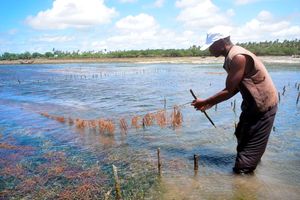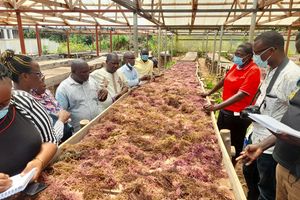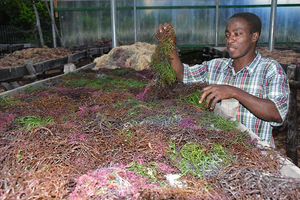
Shangani Amani Self Help Group Vice Chairlady Mwanasiti Ali (centre) from Nyumba Sita, Msambweni in Kwale County at their seaweed farm on April 30, 2025. She says ‘mwani’ farming has empowered most women in their group financially as a revenue stream.
Under the blazing sun on Paje Beach in Zanzibar, a group of women sits waist-deep in the Indian Ocean, weaving ropes and tying seaweed to sticks submerged just a few hundred metres from the shore.
Among them is Pili Halili, who has been working on seaweed farming on and off since 2005. Today, she is one of the 10 women employed by Mwani Zanzibar Ltd, a company focused on the production, processing and export of seaweed.
“Seaweed farming was not always profitable,” Pili says. “I left it for a while because the price per kilogramme was just too low – about TSh700 (a little over KSh30).”
Years later, Halili returned to the practice under a group programme that pooled resources and created a more structured approach to seaweed farming. “Now, I don’t regret coming back. Seaweed has enabled me to support my family and educate my children,” she says.
Her story echoes across the region, including in Kenya’s coastal county of Kwale, where women like Mwanasiti Athumani and Mwanasiti Ali Juba are driving similar change. Based in Msambweni, they began farming seaweed individually in 2011. By 2018, under the Shangani Amani Group, they organised themselves into a cooperative – transforming seaweed from a subsistence crop into a commercial venture.
“We started selling seaweed at Sh19 per kilogramme,” Athumani says. “Now we’re selling at Sh50. We can harvest up to 10 tonnes at a time.”
These grassroots efforts have begun to attract international attention — and rightly so. The importance of this quiet revolution in East African coastal communities was amplified at the Third United Nations Ocean Conference (UNOC3) in Nice, France, on June 13, 2025.
A high-level panel co-chaired by the Zanzibari Minister for Blue Economy and Fisheries, Shaaban Ali Othman, placed seaweed farming alongside fish and shellfish as a pillar in the war against hunger and poverty.
“Seaweed is not just an export commodity. It can be an important part of nutrition and income strategies, especially for women,” said Shakuntala Haraksingh Thilsted of the Consortium of International Agricultural Research Centres during the panel session titled “Promoting the Role of Sustainable Food from the Ocean for Poverty Eradication and Food Security”.
The global momentum behind seaweed and marine biomaterials continues to build fast. Two of the key recommendations of the Fifth UN Conference Forum – held earlier this year – include the establishment of an international support platform for seaweed and biomaterials, and the promotion of innovative marine-based products.
These align directly with the realities and aspirations of women like Pili and Athumani, who are already experimenting with seaweed-derived cosmetics, powders and even livestock feed.
Flower Msuya, a seaweed researcher with the Zanzibar Seaweed Cluster Initiative, says that 15,000 to 20,000 people – mostly women – are engaged in seaweed farming on the island alone. “Unguja contributes about 25 per cent of the country’s production, while Pemba produces the remaining 75 per cent,” Msuya says.
Yet, the industry remains under-supported, despite its contributions to women’s economic empowerment, livelihoods and climate adaptation. UNOC3 experts have called for a “blue transformation,” urging governments and investors to integrate aquatic foods – including seaweed – into food security policies and programmes. “Countries stand to gain if we put aquatic food systems at the heart of our development agenda,” said Jim Leape, a scientist at Stanford University in the US.
But the sector, especially in East Africa, continues to encounter numerous challenges. Farmers like Halili and Athumani are no strangers to hardship. The work is physically demanding and increasingly affected by changing weather patterns.
“Rising ocean temperatures and stronger tides affect seaweed growth, often washing away entire plots,” explains Pius James, a manager at Mwani Zanzibar Ltd. Systemic issues compound these environmental pressures in Kenya.
Norah Magangi of the Kenya Marine and Fisheries Research Institute (Kemfri) points to the lack of policy support, poor infrastructure and exploitation by middlemen. “There are no regulations to protect farmers. Buyers set the prices and middlemen profit the most. This leaves the actual farmers struggling financially,” she says.
But still, there is hope. Drawing inspiration from Asia’s billion-dollar seaweed industries, experts stress the need for East Africa to invest in technology, market development and climate-adaptive farming.
“In Japan, for instance, automated systems and research-supported techniques ensure stable harvests despite environmental stress,” says Mirko Dunner of the UN Conference on Trade and Development. “East Africa can do the same with targeted support.”
Local farmers are already experimenting. In Zanzibar, Pili Halili and others are trying hardier seaweed species and improving drying techniques. In Kenya, Athumani and her group are working towards acquiring a machine to process seaweed into powder for cosmetics and exports.
“We have bought livestock, started making lotions and bar soap and are now looking to scale up,” Athumani tells the Seeds of Gold.
And as international demand grows for plant-based, climate-smart products, East Africa’s seaweed farmers find themselves at the intersection of opportunity and urgency. “Seaweed farming offers dignity, income and resilience to thousands of women in the region. Now we need political will, policy reform and inclusive investment to help them expand,” Dr Msuya explains.







